Related Research Articles
The music of Saudi Arabia includes both Western and traditional music. The most distinguished musician in recent Saudi history is Tariq Abdulhakeem, who composed hundreds of famous Saudi songs for himself as well as for other singers; Saraj Omar has become a very prominent composer after writing the music for the Saudi national anthem; Mohammed Abdu, the most famous singer in the Arab World; Talal Maddah who died in August 2000 while singing in the summer festival on the stage of Al-Muftaha Theatre in the southern region of Saudi Arabia. The 1st Arab Pioneers Festival, which was held in Cairo under the patronage of the Arab League, honored four of the lead composers in Saudi Arabia: Tariq Abdulhakeem, Ghazi Ali, Mohamed Alsenan, and Mohammed Shafiq. Of the same generation are the oud virtuoso Abadi al Johar, Rabeh Saqer and Abdul-Majeed Abdullah.

Human rights in Saudi Arabia are a topic of concern and controversy. The Saudi government, which mandates both Muslim and non-Muslim observance of Islamic law under the absolute rule of the House of Saud, has been accused of and denounced by various international organizations and governments for violating human rights within the country. The authoritarian regime ruling the Kingdom of Saudi Arabia is consistently ranked among the "worst of the worst" in Freedom House's annual survey of political and civil rights.

The Committee for the Promotion of Virtue and the Prevention of Vice is a government religious authority in Saudi Arabia that is charged with implementing the Islamic doctrine of hisbah in the country. Established in 1940, the body gained extensive powers in the 1980s and continued to function as a semi-independent civilian law enforcement agency for almost 35 years until 2016, when societal reforms driven by then-deputy crown prince Mohammed bin Salman led to limiting some its authority through a royal decree by King Salman bin Abdulaziz, including the rights of pursuing, questioning, detaining and interrogating suspects.

The roles of women in the Arab world have changed throughout history, as the culture and society in which they live has undergone significant transformations. Historically, as well as presently, the situation of women differs greatly between Arabic speaking regions, their urban or rural population and age groups. Among other factors, these differences can be attributed to local traditions, culture and religion, women's social or legal status, their level of education, health or self-awareness. Since the 19th century, and notably through the influence of the colonization in North Africa, the Arab Renaissance in Egypt, Lebanon, and Syria, and the end of the Ottoman Empire, the social and economic changes in the Arab world have become greatly accelerated and diversified.

Women's rights in Saudi Arabia are a topic of concern and controversy internationally. Saudi women have experienced major legal rights reforms since 2017, after facing Wahhabism religious fundamentalist dominance dating from 1979.

Lubna Suliman al-Olayan is a Saudi business woman and former CEO and Deputy Chairman of Olayan Financing Company.
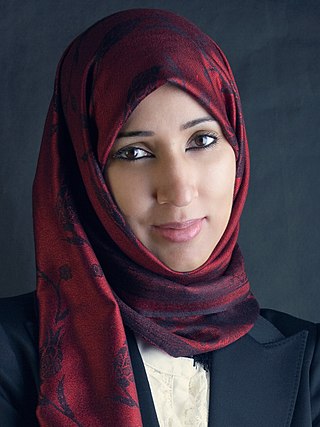
Manal al-Sharif is a Saudi women's rights activist who helped start a right to drive campaign in 2011. Wajeha al-Huwaider filmed al-Sharif driving a car as part of the campaign. The video was posted on YouTube and Facebook. Al-Sharif was detained on 21 May 2011, released, and then rearrested the following day. On 30 May, al-Sharif was released on bail, on the conditions of returning for questioning if requested, not driving, and not talking to the media. The New York Times and Associated Press associated the women's driving campaign as part of the Arab Spring and the long duration of al-Sharif's detention due to Saudi authorities' fear of protests.

Until June 2018, Saudi Arabia was the only country in the world in which women were forbidden from driving motor vehicles. The Women to Drive Movement was a campaign by Saudi women, whom the government denies many rights to which men are entitled, for the right to drive motor vehicles on public roads. Dozens of women drove in Riyadh in 1990 and were arrested and had their passports confiscated. In 2007, Wajeha al-Huwaider and other women petitioned King Abdullah for the right to drive, and a film of al-Huwaider driving on International Women's Day 2008 attracted international media attention.
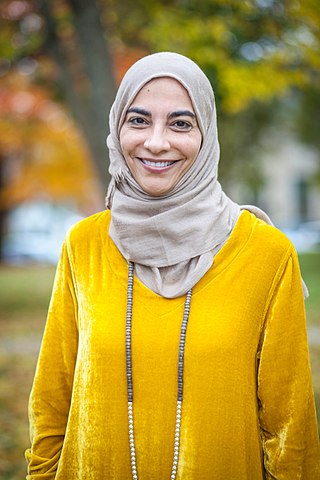
Dr. Hayat Al Sindi is a Saudi Arabian medical scientist and one of the first female members of the Consultative Assembly of Saudi Arabia. She is famous for making major contributions to point-of-care medical testing and biotechnology. She was ranked by Arabian Business as the 19th most influential Arab in the world and the ninth most influential Arab woman. In 2018, she was listed as one of BBC's 100 Women.
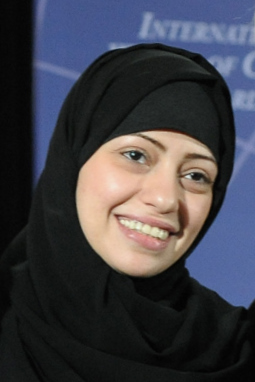
Samar bint Muhammad Badawi is a Saudi Arabian human rights activist. She and her father filed court cases against each other. Badawi's father accused her of disobedience under the Saudi Arabian male guardianship system and she charged her father with adhl—"making it hard or impossible for a person, especially a woman, to have what she wants, or what's rightfully hers; e.g, her right to marry" according to Islamic jurisprudence—for refusing to allow her to marry. After Badawi missed several trial dates relating to the charge, an arrest warrant was issued for her, and Badawi was imprisoned on 4 April 2010. In July 2010, Jeddah General Court ruled in Samar Badawi's favor, and she was released on 25 October 2010, and her guardianship was transferred to an uncle. There had been a local and international support campaign for her release. The Saudi NGO Human Rights First Society described Badawi's imprisonment as "outrageous illegal detention".
Women's sport in Saudi Arabia has been a controversial topic for many years due to the suppression of female participation in sport by conservative Islamic religious authorities.
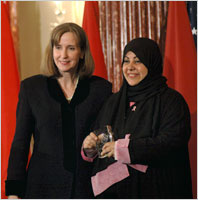
Samia al-Amoudi is a Saudi Arabian obstetrician and gynecologist, Healthcare activist and professor. She is the head of the Sheikh Mohammed Hussein Al-Amoudi Center of Excellence in breast cancer. She is best known for her work in raising breast cancer awareness, after diagnosing herself with the disease. She is also the first woman from the Gulf Cooperation Council to sit on the Union for International Cancer Control board.
Arwa Al-Hujali was Saudi Arabia's first woman trainee lawyer.

Waleed Sami Abulkhair is a Saudi Arabian lawyer and human rights activist, and the head of the Monitor of Human Rights in Saudi Arabia (MHRSA) organization. He is the first activist to be prosecuted by the Terrorism Law. He was arrested on 15 April 2014, and was sent to al-Ha'ir Prison while awaiting prosecution. On 6 July 2014, Abulkhair was sentenced to 15 years in prison by the Specialized Criminal Court, and a travel ban for another 15 years, in addition to a fine of 200,000 riyals (US$53,333). On 12 January 2015, the case returned to the Court of Appeals, after which the judge requested increasing the previous sentence, because Abulkhair refused to apologize. Thus, the judgment was tightened to 15-year executed. In response, Abulkhair prayed for God's victory and refused to recognize the legitimacy of the Specialized Criminal Court. Abulkhair is incarcerated in the Dhahban Central Prison in Jeddah, Saudi Arabia, a facility used to hold high-profile political prisoners, as well as members of Al Qaeda and the Islamic State.
There has been an increase in public galleries exhibiting modern art in Saudi Arabia. This is supported by the influx of commercial galleries in the country and a growing grass-roots movement of artists which have acquired international status. Saudi Arabia is making its mark on the contemporary art scene and at the centre of this are women. These artists are noted for pushing at existing boundaries in the socially conservative country. Their work is largely feminist in nature—posing questions on the current political climate and women's rights. They question existing parameters and challenge proposed gender roles and social norms and use art to express injustices in order to give voice to an otherwise marginalized group.
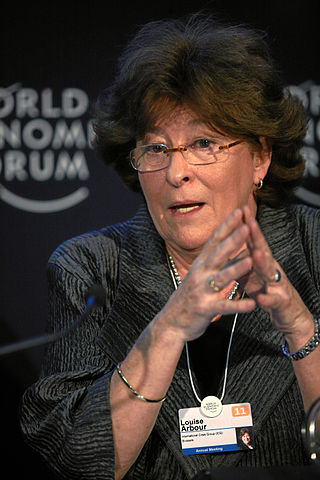
Women in law describes the role played by women in the legal profession and related occupations, which includes lawyers, paralegals, prosecutors, judges, legal scholars, law professors and law school deans.
Sofana R. Dahlan is an accomplished Saudi lawyer and social entrepreneur. She holds the prized distinction of being among the first three female lawyers to have been granted the permit to practice law in Saudi Arabia and has served as a legal consultant in different parts of the Arab world including Saudi Arabia, Lebanon, and Kuwait. Dahlan was also the Vice Governor for Entrepreneurship Advancement at the Small and Medium Enterprises Authority of Saudi Arabia from 2016 to 2017, making her the first Saudi female senior economic policymaker. Most recently she has enrolled at King's College, London in order to pursue a PhD in Culture Media and Creative Industries specialising in: The Obstacles Facing the Development of Creative Industries in Saudi Arabia: A Deep Dive into Intellectual Property Infringement and its Implications.

Sameera Aziz is a Saudi media personality, social worker, radio host, and businesswoman. She is a Jeddah-based Saudi national. Her companies are Sameera Aziz Group and Sameera Aziz Entertainment, the latter of which was the first Saudi production house in India. Aziz is the first Saudi female director in Bollywood. Her events company holds a Guinness World Record for making world's largest human-picture mosaic in 2017.

Reema Juffali, also spelt either as Reema Al Juffali or Reema Al-Juffali, is a Saudi Arabian professional racing car driver who competes in the International GT Open with her own team, Theeba Motorsport. She is the first-ever Saudi Arabian woman racing driver, the first Saudi woman to hold a racing license and also the first Saudi woman to win an international motor race. In November 2019, she became the country's first woman racing car driver to take part in an international racing competition in the Kingdom of Saudi Arabia.
References
- ↑ "Saudi Arabia grants license to first female lawyer". Al Arabiya. 7 October 2013.
- ↑ Valentine, Simon Ross (2015). Force and Fanaticism: Wahhabism in Saudi Arabia and Beyond. Oxford University Press. ISBN 9781849044646.
- ↑ "Saudi Arabia". International Studies. Retrieved 2017-12-27.
- ↑ "Bayan Mahmoud al-Zahran—A Saudi Woman with a Mission - Fanack.com". Fanack.com. Archived from the original on 2020-09-26. Retrieved 2017-12-27.
- 1 2 3 4 Khan, Fouzia (3 January 2014). "First female law firm opened in Jeddah". Arab News.
- ↑ Iaccino, Ludovica (7 January 2014). "Saudi Arabia Opens First Female Law Firm". International Business Times.
- ↑ "The World's 100 Most Powerful Women: Bayan Mahmoud Al Zahran". Arabian Business. 3 March 2014.
- ↑ "World's Greatest Leaders: Bayan Mahmoud Al-Zahran". Fortune. 2015.